essay, trait, crônica, quaestio, topos, excursus, digression etc
Don't wanna be here? Send us removal request.
Text
I spent ten years building up a following on Tumblr. I had 30k+ followers, great engagement, it helped my career thrive like nothing else. I could quit my day job and live off the fan base I’d accrued.
Then, their policies changed. Half my work was no longer allowed. People left the site in droves. I left too, for awhile. I came back to a ghost town. I still have 25k followers, but I don’t think more than 10% are active anymore. I’m followed by ghosts. Same with DeviantArt, although I was never quite as big there, and I’ve been gone so much longer.
This disallowed half of my work was never allowed on Facebook in the first place, or Instagram, but their algorithms are such that my stuff rarely makes it to anyone’s feeds, and if I post a link to where people could actually pay me for my content, it’s hidden unless I pay for it. Patreon swept my work away to a dark corner where no one could see it unless I personally guided them there. Twitch is so strict you can’t even show bare feet. The death of Google Reader means nobody follows RSS feeds anymore, so I can’t direct people to my own site.
So there’s Twitter I guess, where I can post whatever I want, but again, algorithms. But more than that, I don’t have the energy to build up a following once again on a site I don’t own that can delete my career on a whim. The thought of spending time jumping around through hoops for attention just to have it taken away again has stripped any motivation I had to try.
The internet has been gentrified. All the small cute houses and mom & pop shops have been shut down and replaced by big corporations that control everything. I’ve been making webcomics for twenty years, and at the start, the internet was a beautiful wild place. Everyone had a home page. It was like having a house and people came to visit you and you would visit other people in their houses. Now, we don’t visit each other in personal spaces anymore. It’s like we have to visit each other in the aisles of a megamart. Everything is clean and sanitized and the weirdos who made the internet what it was are no longer welcome. No space for freaks anymore.
People still ask me for advice on how to break into comics, and I don’t have any wisdom because I don’t recognize the internet anymore. I don’t feel comfortable working within its boundaries which seems to be getting smaller and smaller and smaller. None of the tools I used when I started exist anymore. They’ve been replaced by things I don’t know how to use. I don’t think I could break into comics today. 2002 had so few barriers compared to now. You might have started on Keenspace, but you could reach a point where you could break away to your own site and people would go to it. Now, you start on Webtoon or Patreon and I guess you just stay there? It feels so much like owning a hardware store for years and then having to go work as a cashier at the Home Depot that put you out of business. I’m looking at my career trajectory and it all points to being a Wal-Mart greeter with uncontrolled arthritis.
I don’t want to make “content,” I want to make comics, I want to make art, and I want to do it in a space that is mine. I’m not sure there’s a place for that anymore.
73K notes
·
View notes
Text
When someone takes a game too seriously, it very quickly loses its fun.
Human incarnation is like that, but worse.
The ego is an emergent self, meaning it "emerges" from a collection of things that aren't a self.
Primarily the ego exists in reference to the body-mind but it may also grow to include habits, likes, dislikes, physical appearance, language, culture, and education.
If any of those are removed or changed, you still exist. Yet the character you feel yourself to be may or may not feel different. The distinction between the feeling of existence and our felt identity is vital to understand.
The feeling of existence is awareness. Awareness knows itself; it exists and knows it exists. It is changeless and continuous.
Awareness illuminates the play of consciousness. To us, consciousness is the perpetually changing experience of a human body-mind. It is all we have known since birth. Our felt identity, the ego, emerges in the body-mind from certain collected patterns of consciousness.
A metaphor may make understanding this more intuitive and clear:
Think of awareness as electricity, consciousness as the images produced on a TV screen by means of electricity, and the ego as the character appearing on the TV screen with whose life and story we identify.
Your feeling of existence (awareness), is entirely uncaused and untouched by the appearance, changes, and disappearance of the character on the show, or even by the show itself (consciousness). Despite this, we live our lives unaware of being anything other than our character and their story.
This is the illusion. Not the show or the characters but the belief that you are the character, that your feeling of existence comes from the character. That is existential ignorance and it creates immense suffering--both for ourselves and for each other.
Three consequences arise inherent to the ego:
1. Existential dread.
We feel that our existence begins with our character's birth and ends with our character's death. Imagine if you were playing a video game and you were brainwashed to believe the same thing about your game character. Would the game be fun or would it be terrifying?
Our human life and everything we know regarding it will end. Who knows what if anything endures after death. It's fair to assume basically nothing. That's something with which we all need to come to terms. But our sense of existence, of being alive, does not end. That is a big deal and makes a big difference.
2. The sense of separation.
As we live wholly identified with that character, we take their side in all matters. It creates a sense of separateness and it is the basis for disharmony, conflict, and confusion. It is also the sense of separateness that creates the feeling that we are lacking something, that something is missing in life. This then leads to the drive described next.
3. The search for happiness.
The combination of our felt sense of separation with our belief that our existence begins and ends with our character poses a problem. It means our starting point is that of incompleteness and we have only a limited time to find completion. So we seek happiness and try to avoid suffering.
This seeking drives us even deeper into the illusory predicament. Because 99% of the time, due to our identification with the character, that seeking only ever occurs within the TV show. We try to make that character happy through the things in the TV story and avoid bad things in the story, which just tangles us deeper in the whole belief that the character story is us.
Temporary happiness or temporary relief from suffering is possible, but it is only ever a partial happiness or relief and it is never sustained indefinitely.
The good news is that there is a way to freedom.
"You are not just a meaningless fragment in an alien universe, briefly suspended between life and death, allowed a few short-lived pleasures followed by pain and ultimate annihilation." -- Eckhart Tolle
To review, we all appear as different characters and we all have the feeling of "I," the feeling of existence. That is awareness; it is the electricity underlying the whole TV show. Consciousness is the medium in which the body's senses and mind's thoughts appear. Within the display of consciousness, a derived identity forms in the mind-body shaped by our culture, language, psychological imprints, and the like, as the story plays out.
I have explained why we will never be at ease let alone truly happy so long as we live as if we are a fragment in a story beyond our control. We will be grasping at scraps of pleasure and resolving to endure innumerable hardships only to be facing inevitable obliteration at our moment of death.
When the ego's illusion is broken, the TV show is seen to be an inert play on a screen and the infinite play of awareness and consciousness stands revealed as having been there all along. That is realization, or enlightenment.
The next few points are important to understand, as they are the very reason for why I explained all of this in the first place.
1. The character, the ego, doesn't become enlightened, nor is it destroyed.
Ramana Maharshi once said that enlightenment is like the sun discovering there is no such thing as night or day. Nothing actually changes other than the arising of clarity regarding what has always been the case.
2. Freedom doesn't mean the character gets to do whatever they want.
Freedom is from the illusion of feeling yourself to be the character. This kind of freedom releases a tremendous amount of tension and fear built up within the character.
3. At the same time, the character doesn't go anywhere.
The character still participates in the TV story but now it can do so without such profound confusion and suffering. It can truly begin to have fun. Also, compassion for others spontaneously arises because there are no "others" and there are no sides.
"We're all just walking each other home." -- Ram Dass
For lack of a better term, we call this existential path of awakening "spirituality." One day, I would like to find a better word for it.
LY
246 notes
·
View notes
Note
Hello.
I've seen you posting detailed information about the WGA strike and wondered if you had any suggestions as to how those of us not directly involved can show our support for the Union?
Okay, bearing in mind that all this is entirely subjective at the moment (and so far lacking any more useful input from other sources): a few thoughts.
This will be my third WGA strike. (My first one was in 1988, just after I'd made my first live action sale—s1e6 of ST:TNG). And the thought keeps occurring to me at the moment that this time out, there's a potentially gamechanging player on the field that wasn't there before: truly pervasive social media.
(Adding a cut here, because this goes on a bit...)
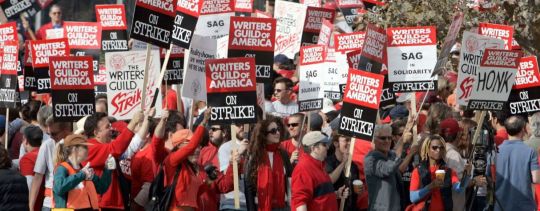
In 2007, social media as we now understand it was still in its cradle. Now, though, those of us who're striking can make our voices much more widely heard. And so can those of us who're not, but just want to show solidarity. Last time, the AMPTP was able to do pretty much what it wanted without the public noticing or having even a medium-profile way to make their feelings known. But this time? Not so much.
So as an otherwise uninvolved person who wants to show solidarity, I'd start with something seemingly low-value. If I was on Twitter, I'd start routinely tweeting about the strike and my support for it—not obsessively, just persistently, a couple/few times a week—using the Twitter hashtags that are gaining ground even now, such as #DoTheWriteThing (and of course #WGAStrike). I would make sure I was following @WGAEast and @WGAWest, to keep an eye on what's going on.
Additionally: I would start politely, but repeatedly—again, maybe once or twice a week at least, and not stopping—tweeting the various major players in the AMPTP, especially the streamers: Amazon, Netflix, Hulu et al. I would start suggesting that their current attitude toward the WGA's contract negotiations is not only unrealistic but potentially (for the AMPTP) bad for business. (And self-destructive, too, as if this goes on much longer in this vein, they'll be seemingly eagerly casting themselves as The Baddies.) I would suggest that their bad behavior, if not amended by them coming to the table to bargain in good faith, might start affecting both my interest in their shows and my willingness to keep paying unreasonable people for access to them.
I should emphasize here that so far there've been no formal calls from anyone for boycotts or subscription cancellations. For the moment, this strikes me as wise. The point for WGA-friendly observers, right now, would be to keep what's happening to the writers visible: to keep bringing it up: to refuse to allow it to be swept under the rug. The "They only want two cents on the dollar!" angle seems potentially useful the more it's repeated. The point is to keep the repetition going: to make it plain, day after day, that the other side's being not just unreasonable, but greedy. Day after day, and week after week, and (if necessary: please Thoth may it not be...) month after month.
And tweeting is hardly all that can be done. Email is cheap and easy. But actual letters, written on actual paper and mailed, can still create a surprising amount of attention in a corporate office. (The saying in TV used to be that for every person who actually writes in about an issue, there are ten, or a hundred, who feel the same way but never got around to it.) Write letters to all the AMPTP members' CEOs, and make your feelings on the WGA's core demands politely plain. ...Especially when those CEOs collectively made almost three-quarters of a billion-with-a-B dollars in salaries last year, when many of the writers working on their shows can't afford rent.
After that: here's another thought, a little more physical. If by chance you're in an area where one or the other of the Guilds are picketing: turn out and support them! Honk when you pass: and if you're interested, show up and offer to walk the picket lines with them. These things get noticed. (In 2007 a bunch of us, both Guild members and non-, caused significant astonishment by turning out to picket AMPTP members' offices in Dublin.)
...Obviously not all that many people are going to be positioned, in terms of location or their own work and time commitments, to show up physically. But online? Find ways to keep this issue visible. The AMPTP wants this to go quiet, wants people to get bored with it, wants people to find reasons to blame the writers. They've tried spinning the story that way before. Don't let them pull that shit. Find ways to back those who're calling them on that, publicly. They do respond to this kind of thing (though they may strenuously deny it). If enough attention continues to be paid by the general public, they will blink—if sometimes excruciatingly slowly, as Disney began to blink over the dispute tagged #DisneyMustPay.
As viewers, and as viewers who pay for subscriptions to things, we far outnumber them. Help be a part of making the AMPTP understand that this quest for a truly fair deal is not going to go away. And the longer they try to act like the Guild's negotiation positions are beneath their notice, the more it's going to hurt them, and the stupider and greedier it's going to make them look.
...That's all I've got for the moment, as I need some lunch. :) ...But I hope this has helped. And thanks for your concern, and your desire to stand in solidarity with us! It's so welcome. :)
13K notes
·
View notes
Text
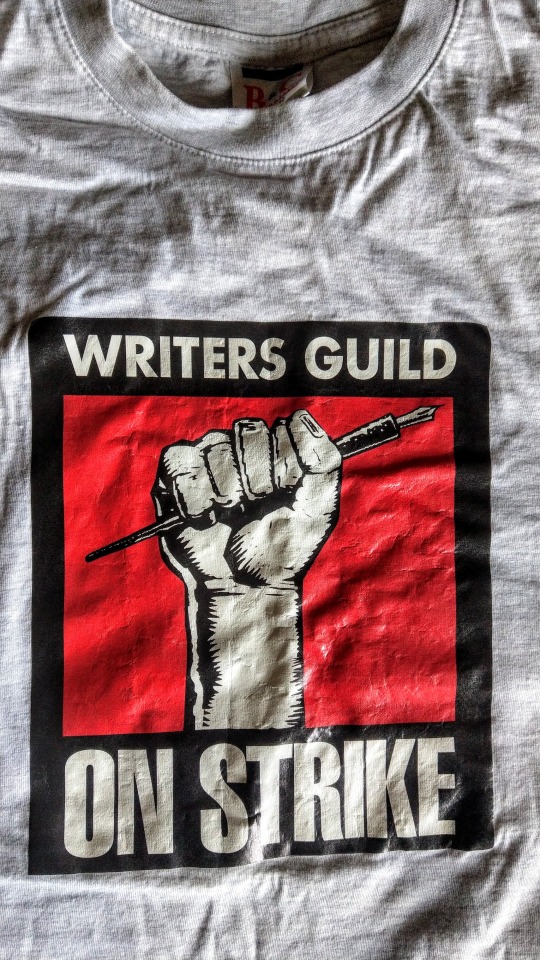
Last used: 2007.
...Ah well. Might as well give this a wash and a tumble. Needs must when AMPTP* drives... :/
Tl:dr; We asked for 2¢ on the streaming dollar. ...They said "Nope, can't afford it." ...As we say in New York: "...Yeah, no."
Time to take a stand. Not just for ourselves, but also for the writers who'll come after us... and who, unless we draw a line in the sand here, will never make enough to establish even middle-income careers.
*The people who, when we proposed that we should have a guarantee of a paid second-draft rewrite on scripts instead of the too-routine demand for multiple "free tweaks", refused to even consider it—but suggested they were willing to do a meeting to educate execs on why screenwriters don't want to work for free. (...DUH.)
For more details about what we asked for, and the producers' (non-)responses, see below.
(ETA—noted with grim pleasure:)

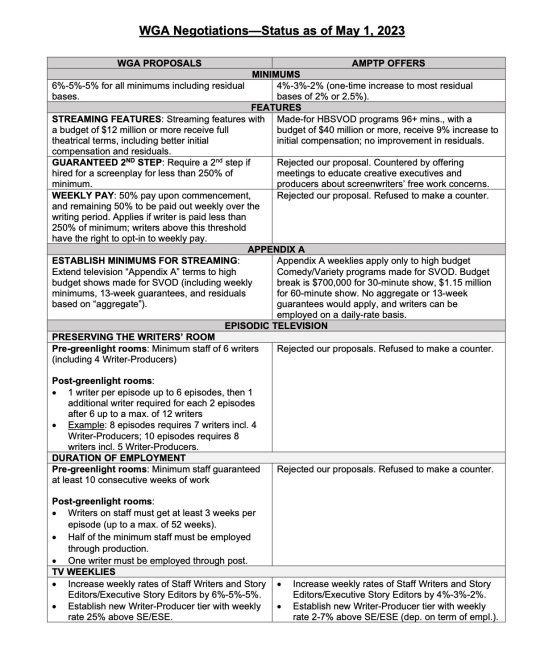
6K notes
·
View notes
Text
Yes!
girls when they dont have an outfit thats mega cute but also casual but weather appropriate but suitable for when you go inside and its warm and comfortable and but also a little special

30K notes
·
View notes
Text
“And anyway, you shouldn’t worry
about discs. That’s healthy.”
“What you sayin’?”
“Make your tunes, record ‘em, wipe over the discs, reuse ‘em. Wipe the samples. Makes you have to find new sounds for each new tune, means you can’t go back after it’s been put down on tape and constantly re-edit everything. Keeps everything fresh.”
Tyrone thinks about this, thinks about the half-broken Akai sampler back in his bedroom. Thinks about the days he spent combing through his vinyl collection, searching for sounds he could take and use, building a library that spans the dozen or so ancient 3.5-inch floppies he spent years tracking down. He thinks about the hours he spends trawling through that library when working on something, trying to find that elusive sound that would make the tune complete, and how often he’d fail. Thinks about how he’d do whatever he could to try to warp and meld those samples into something else; running them through his small collection of effects pedals, recording and rerecording them onto ancient cassettes to make them compressed and distorted, transmitting them over the station’s FM transmitter and resampling them off his auntie’s tiny radio to wrap them in distant hiss and static. And he thinks about his attempts to make his own sounds: drumming on kitchen pots and pans, jacking an old busted set of headphones into the 950’s mic input and dangling them out his bedroom window to catch the staccato rain patterns, the filter sweeps of tenth-story breezes, the shouts and cries of people down in the streets.
Maybe College has a point.
Mike certainly thinks he’s got one. “See? That was the problem. That’s what I’m always sayin’. There was no limits before, right?
Tyrone looks at him, unsure. “Right … ?”
“See … look. Before the crash, right? Nobody was using hardware setups anymore. Everyone was on software. You could get it just by fucking blinking, right? You could get any software you wanted, that’d do anything you wanted. That’d give you any sound you could think of, pretty much. Unlimited possibilities. That was what was wrong, right?”
“It was?”
“Yeah. It was. It fucking was. Think about it. People could do what they liked, anything. It’s why the music became so self-indulgent, so undisciplined, and then so weirdly formulaic. Good art is produced under strict limits. Forces you to work with what you’ve got, to focus, right? There was no focus at the end. No control or vision. Just lots of people fucking about but ultimately following each other’s leads because they were drowning in choices. Unlimited possibilities.”
Tyrone thinks about this now. Sees Mike’s point, but ain’t too sure. Mike annoys him when he talks like this, because Tyrone knows all about limits. He’s sick and tired of limits. “I dunno,” he says. “I’d like just one or two possibilities, you get me?”
College smiles at him, more polite aging sympathy from the first generation that knows they had it better, and can’t muster the gall to deny it. “Don’t worry, Ty, it’ll come together. Just keep at it.”
“Yeah.” Tyrone shrugs. “I guess.”
Tim Maughan, Infinite Detail, MCD x FSG Originals – Farrar, Straus and Giroux, 2019.
2 notes
·
View notes
Text
SUPPORT STARBUCKS UNIONS
Upton Sinclair tries to go up to the counter, but the Starbucks is closed. Starbucks fired all their workers from this location for unionizing.
Hi everyone! It’s been a while. We here at Literary Starbucks have followed the news about Starbucks workers’ fight to unionize, and we want to use the platform we have to support them and uplift their voices.
Starbucks workers across the nation have been unionizing their workplaces to ensure a more democratic, safe, and equitable environment for all employees. The first United States Starbucks to successfully unionize its workers was in Buffalo, NY, in December 2021. Since then, more Starbucks locations all over the country have voted to unionize!
Predictably, Starbucks is not thrilled about this, and has been actively union-busting. As linked above in the Upton Sinclair post, there are many examples of Starbucks closing locations that voted to unionize or firing pro-union workers, but Starbucks has gone even further. They have cut hours for pro-union employees, increased managerial presence in stores in order to monitor union activities, and, recently and abhorrently, claimed that Starbucks will support its workers who are seeking abortion services—but only if they aren’t part of a union.
The National Labor Relations Board (NLRB) has “accused Starbucks of more than 200 labor law violations spanning over two dozen types of unfair labor practices.” In addition to being morally despicable, Starbucks’ union-busting practices are actually illegal.
Literary Starbucks supports workers’ right to unionize and stands with the Starbucks partners who are unionized and/or fighting to unionize. We condemn Starbucks’ anti-union position.
To read more about Starbucks employees’ efforts to unionize, please check out Starbucks Workers United. Headquartered in Buffalo, NY, SB Workers United boasts 180+ stores unionized already. Check out their FAQ for more information!
Here are ways you can support Starbucks workers’ unionization efforts across the USA:
Donate to the Pacific Northwest Starbucks Workers United (PNWSBWU) to, in their own words, “provide financial relief to Starbucks workers in the Pacific Northwest for income [they] lose as [they] take the collective actions needed to win the workplace [they] deserve.”
Donate to the employees of the College Ave Starbucks in Ithaca, NY, since Starbucks closed this unionized location!
Donate to Black Union Leaders in Memphis, TN, to support fired Black union leaders.
Sign the No Contract, No Coffee pledge to support the unionizing workers!
Shop the SB Workers United store! All proceeds directly support Starbucks employees.
SUPPORT STRIKERS! For example, a location in Buffalo went on strike yesterday!
Attend a local “sip-in” rally at Starbucks to support unionization efforts. Here’s an example of a call for a sip-in—check out your local Starbucks stores to see if there is one coming up near you! And make sure you tip big!
Follow SB Workers United on Instagram for the latest news and updates.
Follow SB Workers United on Twitter for the latest news and updates. We pulled most of the donation links directly from that Twitter, so that’s the best place to check to see how you can best help!
Hell, follow us on Twitter as well. We’ll be retweeting stuff from @SBWorkersUnited, @VentiSolidarity, @JortstheCat, and other pro-union accounts to help raise awareness for Starbucks employees working to unionize.
The baristas were always an essential part of the Literary Starbucks mythos. Help support the real-life heroes working in Starbucks locations across the nation today!
In solidarity,
Jill, Nora, and Wilson
572 notes
·
View notes
Note
Extremely frustrating as Palestinians watching the world stand in solidarity with The Ukraine and suddenly knowing how to use the word occupation.
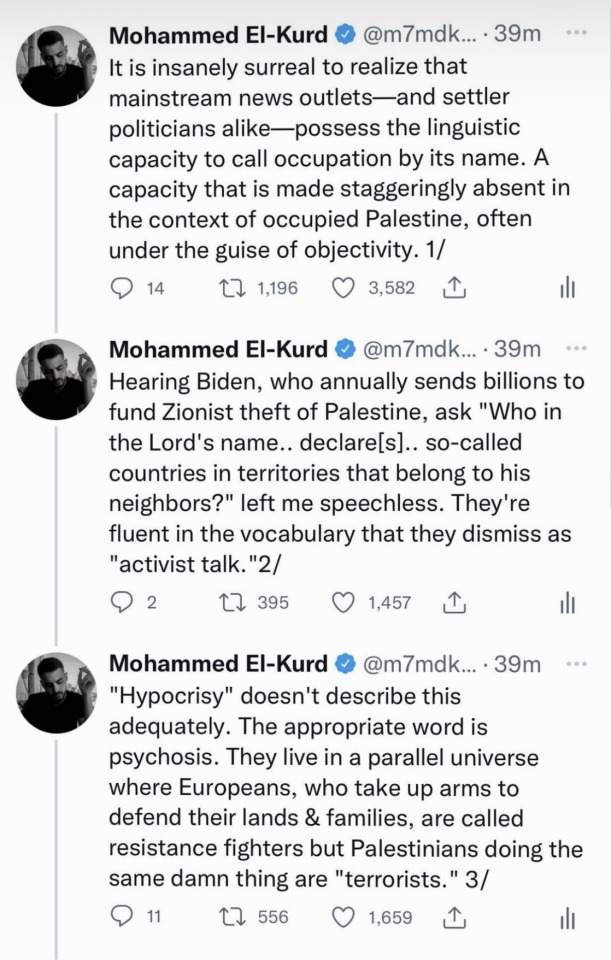
dropping this here

and this one too. they let refugees fleeing a different war freeze to death in the middle of winter while the world turned a blind eye at the frozen corpses of children who were denied asylum and died because of it. this was happening as of two months ago as well, it’s not old news
i stand with ukraine, obviously.
i also stand with those who are calling out the blatant hypocrisy in how others in the same situation were treated, as well as those who are rightfully upset in the world’s support of and reaction to of one group of people but not others who have faced the same and much worse.
and before anyone jumps on this with ‘omg not appropriate right now’ or ‘stop comparing the two’, it’s entirely possible to stand with ukraine and the russians who are protesting the russian govt, while at the same time acknowledging that the world’s eurocentric response to this situation is extremely different to the response it gives other countries in places the western world declares are “backward”, and “uncivilized”
18K notes
·
View notes
Photo

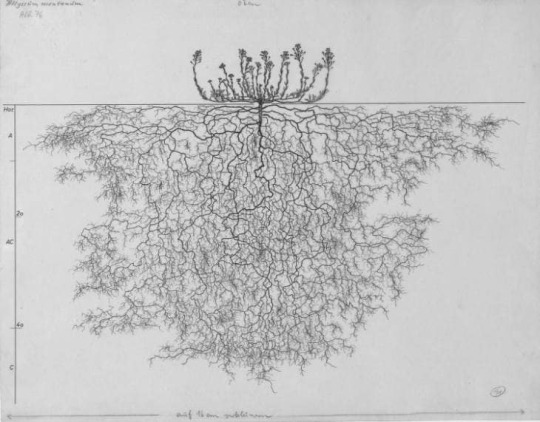

I can’t help but adore these illustrations. The final image is of a late-blooming dandelion. Please don’t worry if you’re a late bloomer, deep roots take time :-)
All images can be found here.
These illustrations are from the Wurzel atlas. To do these drawings, their analysis and descriptions a group of three researchers from the Pflanzensoziologisches Institut, Klagenfurt (now in Bad Goisern, Austria), led by Prof. Dr. Lore Kutschera (1917-2008) dug up all the roots with a scriber (the metalworking tool) and drew each root. This is the culmination of 40 years worth of work!
12K notes
·
View notes
Quote
Ecology talks about areas of life that we find annoying, boring and embarrassing. Art can help us, because it’s a place in our culture that deals with intensity, shame, abjection, and loss. It also deals with reality and unreality, being and seeming. If ecology is about radical coexistence, then we must challenge our sense of what is real and what is unreal, what counts as existent and what counts as nonexistent. The idea of Nature as a holistic, healthy, real thing avoids this challenge.
Timothy Morton, from “Introduction” to The Ecological Thought (via florizels)
70 notes
·
View notes
Text
The question posed
by radical self-love movements is not whether there is a right to sex (there isn’t), but whether there is a duty to transfigure, as best we can, our desires.
To take this question seriously requires that we recognise that the very idea of fixed sexual preference is political, not metaphysical. As a matter of good politics, we treat the preferences of others as sacred: we are rightly wary of speaking of what people really want, or what some idealised version of them would want. That way, we know, authoritarianism lies. This is true, most of all, in sex, where invocations of real or ideal desires have long been used as a cover for the rape of women and gay men. But the fact is that our sexual preferences can and do alter, sometimes under the operation of our own wills – not automatically, but not impossibly either. What’s more, sexual desire doesn’t always neatly conform to our own sense of it, as generations of gay men and women can attest. Desire can take us by surprise, leading us somewhere we hadn’t imagined we would ever go, or towards someone we never thought we would lust after, or love. In the very best cases, the cases that perhaps ground our best hope, desire can cut against what politics has chosen for us, and choose for itself.
Amia Srinivasan, “Does anyone have the right to sex?” in London Review of Books, Vol. 4 No. 6, 22 March 2018
7 notes
·
View notes
Text
being tired all the time is such a mystery.... is it anaemia? vitamin d deficiency? chronic fatigue syndrome? depression? insomnia?? is it just the crushing weight of being alive in a capitalist society??? someone cure me
239K notes
·
View notes
Note
Do you like poems?
yes! my favorites are The Tiger and the unnamed werewolf fridge poem
194K notes
·
View notes
Text
Meaning is always in some sense an approximation, a near-miss, a part-failure, mixing non-sense and non-communication into sense and dialogue.
If this constant sliding and hiding of meaning were true of conscious life, then we would of course never be able to speak coherently at all. If the whole of language were present to me when I spoke, then I would not be able to articulate anything at all. The ego, or consciousness, can therefore only work by repressing this turbulent activity, provisionally nailing down words on to meanings. Every now and then a word from the unconscious which I do not want insinuates itself into my discourse, and this is the famous Freudian slip of the tongue or parapraxis. But for Lacan all our discourse is in a sense a slip of the tongue: if the process of language is as slippery and ambiguous as he suggests, we can never mean precisely what we say and never say precisely what we mean. Meaning is always in some sense an approximation, a near-miss, a part-failure, mixing non-sense and non-communication into sense and dialogue.
Terry Eagleton, Literary Theory: An Introduction. Wiley-Blackwell; 2nd edition (2008)
60 notes
·
View notes
Quote
One of the first things I learn in researching artificial intelligence is that work to model and reproduce the human brain is basically a race to reverse engineer the neocortex: hundreds of billions of cells linked to each other via trillions of connections. At the moment this appears an impracticable amount of links, an unrealizable amount of tie-ins—something impossible to re-create—but Ray Kurzweil suggests that intelligence arrays in the neocortex are actually fairly simple structures, and systems for recognizing, remembering, and predicting a pattern are repeated hundreds of millions of times (redundancy on a grand scale), which in different combinations generates the great variety of our thinking. In other words, it is best to understand the principles of a forest—not by staring intently at each specific variation in an area of bark but—by identifying the distinct patterns of redundancy that are found in the forest as a whole. Or even more simply put, “the concept of a forest is simpler than the concept of a tree.” Ergo, it may not be as difficult as one would think to artificially generate this massive amount of connections. And remember, a preponderance of information + processing power enables increasingly high-resolution operations, computations, and, therefore, output signals; these signals might become so fine and so profuse that they approximate or actually produce affect, which (radiant) might also then leap, invisibly, from person to person or even thing to person, e.g., love.
Harry Dodge, My Meteorite: Or, Without the Random There Can Be No New Thing (via antigonick)
109 notes
·
View notes
Text
A war needs an enemy and successive governments have rallied a war against ‘drugs’, but there is no rationale for the substances we have come to regard as drugs. If we assume a drug is a psychoactive substance that alters our mood state, then we have to include alcohol, tobacco and caffeine along with a wide range of other substances currently categorized as: herbs (e.g. nutmeg); medicines (e.g. codeine); foods (e.g. sugar); and legal highs (e.g. Spice). Angus Bancroft exposing the ‘drug’ fallacy explains:
there are no pharmacological categories of ‘illicit drugs’, ‘licit drugs’ and ‘medications’. They are social categories constructed because as a political community we have come to treat some substances differently from others, depending on who uses them, how and for what.
If instead we assumed that prohibition was concerned with outlawing the most ‘dangerous drugs’, then according to the evidence a range of illegal substances such as khat, LSD, psilocybin mushrooms and ecstasy would become legal; while currently legal substances such as alcohol, tobacco and arguably sugars would become prohibited.
Prohibition, privilege and the drug apartheid: The failure of drug policy reform to address the underlying fallacies of drug prohibition
132 notes
·
View notes